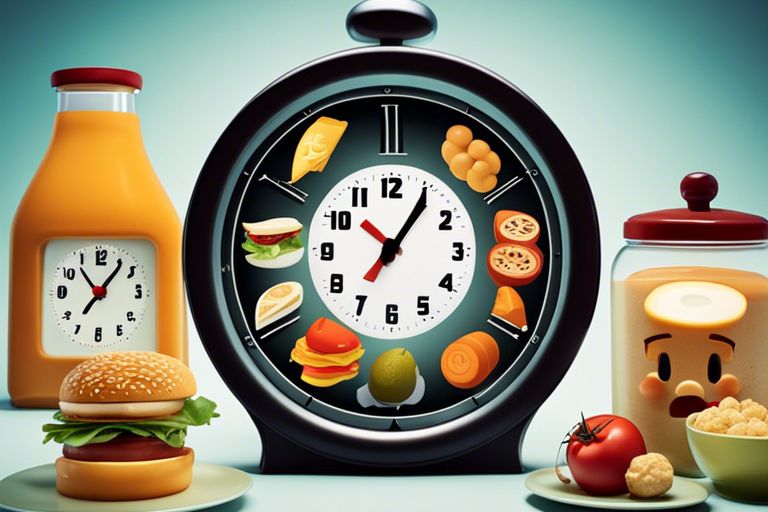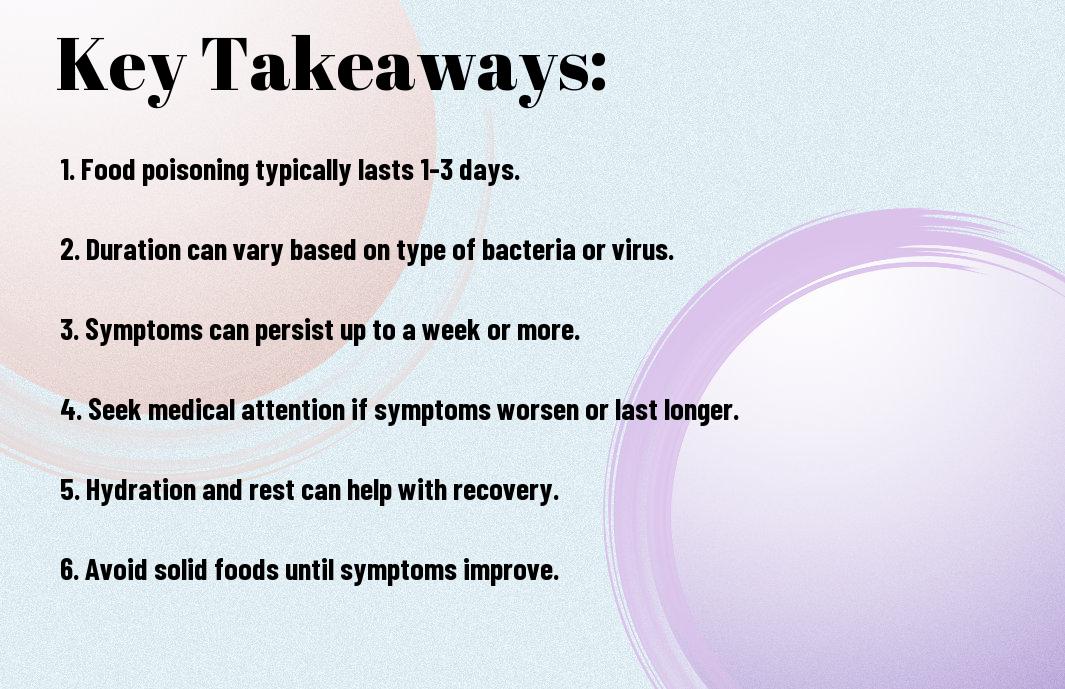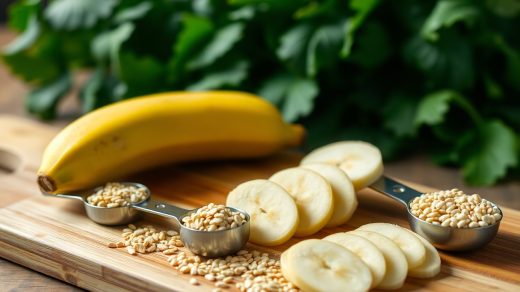Many people wonder how long food poisoning can last and what to do if you’ve eaten something bad. If you’re experiencing symptoms like nausea, vomiting, diarrhea, and stomach cramps, you may be dealing with food poisoning. To learn more about how long food poisoning can last and what steps you can take, check out this informative article on How Long Food Poisoning Lasts and What To Do About It.
Key Takeaways:
- Symptoms duration: Food poisoning symptoms can last anywhere from a few hours to several days.
- Individual factors: The duration of food poisoning can vary depending on the type of bacteria or virus, the amount of contaminated food consumed, and the individual’s overall health.
- Seek medical attention: If symptoms persist for more than a few days, it is important to consult a healthcare provider to avoid complications.
Causes of Food Poisoning
The causes of food poisoning can be categorized into various types of contaminations. These include bacterial contamination, viral infections, and parasitic infestations.
Bacterial Contamination
Bacterial contamination is one of the most common causes of food poisoning. Bacteria such as Salmonella, E. coli, and Campylobacter are found in various foods, especially raw or undercooked meats, poultry, and eggs. When you consume food contaminated with these bacteria, they can multiply in your digestive system and cause symptoms such as nausea, vomiting, diarrhea, and stomach cramps.
Viral Infections
Viral infections, such as norovirus and rotavirus, can also lead to food poisoning. These viruses are highly contagious and can spread through contaminated food or water. When you ingest food or liquids infected with these viruses, you may experience symptoms like vomiting, diarrhea, fever, and body aches.
Understanding viral infections is necessary in preventing the spread of food poisoning. Proper hygiene practices, such as washing your hands before handling food and ensuring that food is cooked at the right temperature, can help reduce the risk of viral contamination.
Parasitic Infestations
Contamination by parasites like Giardia and Cryptosporidium can also cause food poisoning. These parasites are often found in contaminated water sources and can infect fruits, vegetables, and other foods. When you ingest food or water containing these parasites, you may experience symptoms such as diarrhea, weight loss, and stomach cramps.
Parasitic infestations can be prevented by ensuring that your food and water sources are safe and free from contamination. Properly washing and cooking fruits and vegetables, and drinking clean, treated water can help reduce the risk of parasitic food poisoning.
Symptoms of Food Poisoning
Mild Symptoms
Little did you know that mild symptoms of food poisoning can include nausea, vomiting, diarrhea, stomach cramps, and mild fever. These symptoms may appear within a few hours to a couple of days after consuming contaminated food or beverages.
Severe Symptoms
On the other hand, severe symptoms of food poisoning can be more intense and debilitating. With severe food poisoning, you may experience persistent vomiting, high fever, severe dehydration, bloody stools, and abdominal pain. In some cases, it can even lead to hospitalization for treatment and observation.
Food poisoning with severe symptoms can be particularly dangerous for vulnerable populations such as young children, elderly individuals, pregnant women, and those with weakened immune systems. If you or someone you know is experiencing severe symptoms of food poisoning, it is important to seek medical attention promptly.
Common Misconceptions
Food poisoning symptoms are not always limited to stomach-related issues. Some common misconceptions include attributing symptoms like headache, muscle aches, and fatigue to other causes when they could actually be signs of food poisoning. It’s crucial to be aware of the wide range of symptoms that food poisoning can present.

Duration of Food Poisoning
Unlike other illnesses, food poisoning can vary in duration based on several factors. The time it takes for you to recover from food poisoning largely depends on the type of bacteria or virus that caused the illness, your overall health, and how quickly you seek treatment.
Average Recovery Time
To give you an idea, the average recovery time for most cases of food poisoning is around 1 to 3 days. During this time, you may experience symptoms such as nausea, vomiting, diarrhea, stomach cramps, and fever. It’s important to stay hydrated and get plenty of rest during this period to help your body fight off the infection.
Factors Affecting Recovery
Any of the following factors can affect how long food poisoning lasts for you:
- The type of bacteria or virus causing the illness.
- Your age and overall health.
- Whether you receive medical treatment or manage symptoms at home.
Any underlying health conditions or weakened immune system can also prolong your recovery time from food poisoning. It’s necessary to listen to your body and seek medical attention if your symptoms worsen or persist for more than a few days.
When to Seek Medical Attention
For most cases of food poisoning, you can recover at home with rest and adequate hydration. However, there are certain signs that indicate you should seek medical attention promptly. These include:
If you experience severe dehydration, bloody stools, high fever, persistent vomiting, or signs of neurological symptoms such as blurred vision or muscle weakness, it’s crucial to seek medical help immediately. In some cases, food poisoning can lead to complications that require medical intervention.
Duration of food poisoning can vary from person to person, but most cases resolve within a few days with proper care and hydration. However, if you experience severe symptoms or your condition does not improve, it’s best to consult a healthcare professional for proper evaluation and treatment.

Treatment Options
Many cases of food poisoning can be effectively managed at home with appropriate treatment. The main goal of treatment is to prevent dehydration and make you feel more comfortable as your body fights off the infection.
Fluid Replacement Therapy
Replacement of fluids and electrolytes is crucial in managing food poisoning. You may lose fluids through vomiting and diarrhea, leading to dehydration. Drinking plenty of water, clear broths, or oral rehydration solutions can help replace lost fluids and prevent dehydration. In severe cases, intravenous fluids may be necessary to restore hydration levels.
Medications for Relief
Treatment for food poisoning may also involve medications to help alleviate symptoms such as nausea, vomiting, and diarrhea. Over-the-counter medications like loperamide (Imodium) can help reduce diarrhea, while anti-nausea medications like ondansetron (Zofran) can help control vomiting. These medications should only be used under the guidance of a healthcare provider, as they may not be suitable for everyone.
It is necessary to note that antibiotics are typically not recommended for most cases of food poisoning, as they may prolong the illness or cause unnecessary side effects.
Home Remedies and Natural Cures
Relief from food poisoning symptoms can also be found through various home remedies and natural cures. Consuming ginger tea or peppermint tea may help ease nausea and settle your stomach. Additionally, probiotics found in yogurt or supplements can aid in restoring the balance of healthy bacteria in your gut, promoting quicker recovery. Resting, avoiding solid foods for a period, and slowly reintroducing bland foods as tolerated can also support your body in recovering from food poisoning.
Understanding the various treatment options available can help you manage food poisoning effectively and speed up your recovery process. Remember to consult with a healthcare provider if your symptoms worsen or persist for more than a few days.
Complications of Food Poisoning
Dehydration and Electrolyte Imbalance
With food poisoning, one common complication you may experience is dehydration and electrolyte imbalance. Severe vomiting and diarrhea can lead to a significant loss of fluids and imperative electrolytes like sodium and potassium from your body. Dehydration can make you feel weak, dizzy, and increase the risk of fainting.
Infections and Organ Damage
With certain types of food poisoning caused by harmful bacteria like E. coli or Salmonella, the infection can spread beyond the digestive system and potentially lead to organ damage. These bacteria can invade the bloodstream and affect organs such as the kidneys, causing a condition called hemolytic uremic syndrome (HUS). Symptoms of HUS include decreased urination, fatigue, and paleness.
Electrolyte imbalances can also occur as a result of severe food poisoning, especially if you are unable to replenish the lost fluids and electrolytes adequately. This can further complicate your recovery and may require medical intervention to restore the balance of electrolytes in your body.
Long-term Health Consequences
For some people, food poisoning can have long-term health consequences even after the initial symptoms have resolved. Infections like Listeria, for example, can lead to serious complications such as meningitis or septicemia, which may require prolonged treatment with antibiotics. Additionally, some individuals may develop post-infectious irritable bowel syndrome (IBS) following a severe case of food poisoning, leading to ongoing digestive issues.
Consequences of severe food poisoning can impact your overall health and well-being, emphasizing the importance of seeking medical attention if you experience persistent or worsening symptoms. It’s imperative to monitor your health closely and follow up with a healthcare provider to address any lingering effects of food poisoning.
Prevention Strategies
Safe Food Handling Practices
All food poisoning cases are preventable with proper food handling. The key to preventing foodborne illnesses is ensuring that you practice safe food handling techniques. This includes washing your hands before and after handling food, keeping raw and cooked foods separate, cooking food to the appropriate temperatures, and refrigerating leftovers promptly.
Avoiding High-Risk Foods
One of the most effective ways to prevent food poisoning is by avoiding high-risk foods such as raw or undercooked meat, poultry, seafood, and eggs. These foods are more likely to be contaminated with harmful bacteria like Salmonella, E. coli, or Listeria. It’s crucial to cook these items thoroughly to kill any bacteria present and reduce your risk of food poisoning.
High-risk foods are called so because they are more susceptible to bacterial contamination, especially if not handled and cooked properly. By avoiding these high-risk foods or ensuring they are cooked thoroughly, you can significantly reduce your chances of developing food poisoning.
Boosting Immunity and Gut Health
Handling food with unwashed hands can introduce harmful bacteria into your system, potentially leading to food poisoning. Boosting your immunity and maintaining good gut health can help your body fight off any bacteria that you may have accidentally ingested. Eating a balanced diet rich in fruits, vegetables, and probiotics can strengthen your immune system and improve gut health, reducing your susceptibility to foodborne illnesses.
A healthy gut is crucial for overall well-being and can aid in digestion and absorption of nutrients. By incorporating probiotic-rich foods like yogurt, kefir, and sauerkraut into your diet, you can support the good bacteria in your gut and promote a robust immune system to help protect against food poisoning.

To wrap up
Following this guide on how long food poisoning lasts, you now have a better understanding of the typical duration of food poisoning symptoms. Remember that most cases of food poisoning resolve within a few days without any medical intervention. It is crucial to stay hydrated, rest, and avoid certain foods until you feel better. If your symptoms persist for more than a few days, or if you experience severe symptoms such as high fever or bloody diarrhea, seek medical attention promptly.
FAQ
Q: How long does food poisoning typically last?
A: The duration of food poisoning can vary depending on the type of bacteria, virus, or toxin that caused it. In general, symptoms of food poisoning usually last for 1 to 3 days. However, some cases may last up to a week or more.
Q: What are the symptoms of food poisoning?
A: Symptoms of food poisoning can include nausea, vomiting, diarrhea, stomach cramps, fever, and fatigue. Depending on the cause, symptoms may appear within hours of consuming contaminated food or they may take days to develop.
Q: When should I see a doctor for food poisoning?
A: You should see a doctor if your symptoms are severe, persistent, or if you have additional risk factors such as a weakened immune system, pregnancy, or underlying health conditions. Signs that you should seek medical attention include dehydration, high fever, bloody stools, and inability to keep liquids down.



